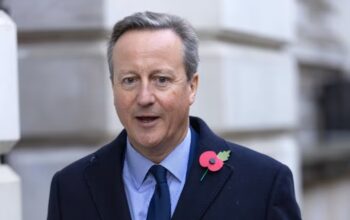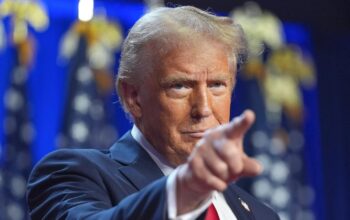When the Republican presidential candidates gather for their first debate this week, the encounter is likely to center on the legal problems of the man all of them are chasing.
Former President Donald Trump has solidified his lead in the GOP race by convincing most Republican voters to view his four criminal indictments as a politicized “witch hunt” aimed not only at him, but them.
Trump’s success in selling that argument to GOP voters has some immediate causes, key among them the choice by all of his leading competitors in the race, as well as most prominent voices in conservative media, to echo rather than challenge his contention. But the inclination of so many Republican voters to dismiss all of the charges accumulating against Trump also reflects something much more fundamental: the hardening tendency of conservatives to believe that they are the real victims of bias in a society irreversibly growing more racially and culturally diverse.
From the outset of Trump’s political career, he has channeled that sentiment into his seemingly unbreakable bond with his core supporters. Now, Trump has transformed his multiple indictments – particularly from Black prosecutors he has repeatedly called “racist” – into just the latest proof point for the widespread belief within the GOP base that the biggest victims of discrimination are the groups most of them belong to: Christians, men and Whites.
“Victimhood is embedded in every part of Trump’s campaign, personality, communications, and strategy,” says Tresa Undem, a pollster for progressive causes. “The only thing that shifts is the topic and the object of blame.”
The choice by most GOP leaders and voters alike to rally around Trump amid 91 felony charges underscores again how much protection that sense of victimhood provides him against behavior previously considered fatal for any political leader. But, as this week’s debate will almost certainly demonstrate, it also shows that Trump’s belligerent approach toward all the forces he says are threatening conservatives – from the “deep state” to the media and entertainment industry, to protesters in the Black Lives Matter and #metoo movements – will remain central to the GOP message, whether he stays the party’s principal figure or not.
The broad rejection of the charges against Trump within the GOP base marks a milestone not only in its personal allegiance to him, but also in those voters’ systemic alienation from the major institutions in American life. In the Republican coalition, it is a moment that has culminated decades of change – and one that points to years of turbulence ahead.
Overwhelming majorities of Republican voters dismiss the charges against Trump. In a comprehensive recent national survey by Bright Line Watch, a collaborative of political scientists studying threats to American democracy, 15% or fewer of Republicans said Trump had committed a crime either in his efforts to overturn the 2020 election, his actions on January 6, 2021, or his hush money payments to adult film star Stormy Daniels in 2016; only one-in-four thought he had broken the law in his handling of classified documents. And in the hush money and classified document cases, over four-fifths of Republicans agreed that “Trump would not have been prosecuted…if he were someone else.” A CBS/YouGov poll released Sunday recorded similar attitudes and produced one more head-turning finding: a bigger share of GOP voters said they trusted Trump to tell them the truth than any other source tested, including not only conservative media figures and religious leaders, but even their own “friends and family.”
Some of the attitudes that have helped Trump delegitimize the charges with Republicans are recent; others are much more long-standing. Trust in the federal government plummeted for voters in both parties amid all the tumultuous events of the 1960s and early 1970s – from Vietnam to Watergate to the assassinations of leading public figures – and has never really recovered. In the 1980s, Ronald Reagan added another brick to the wall of distrust among Republicans specifically with his argument that government was not the solution to our challenges, but the problem. “There’s really been this effort on the right, among Republicans, to use distrust to stoke their base and to mobilize their base,” says Amy Fried, professor of political science at the University of Maine and co-author of the 2021 book: “At War With Government: How Conservatives Weaponized Distrust from Goldwater to Trump.”
Even through the Reagan years, federal law enforcement agencies were somewhat sheltered from the rising conservative antipathy toward Washington. But, as Fried and other experts note, that changed in the 1980s and 1990s when gun owner groups led by the National Rifle Association escalated their attacks on federal law enforcement as threats to the liberty of their members. (That campaign reached a peak when the NRA attacked federal agents as “jack-booted government thugs.”) The Republican hostility to federal law enforcement took another big leap forward when Trump and his allies (such as Steve Bannon) mainstreamed the claim that a “deep state” of entrenched federal officials, particularly in intelligence and law enforcement, were allegedly plotting against conservatives.
Years of these arguments opened a gap between conservative attitudes toward local police and federal law enforcement, notes Eric Plutzer, a Penn State University political scientist who directs the Mood of the Nation poll at the nonpartisan McCourtney Institute for Democracy. “If local police are blue collar protectors of law and order,” Plutzer says, “the lawyers and others with fancy degrees in the FBI come to be seen as not much different than unpatriotic career State Department internationalists.”
The FBI’s role in the investigation of connections between the Trump campaign and Russia in 2016, and its decision not to prosecute Hillary Clinton for her handling of emails as secretary of state, made the bureau a particular lightning rod for the former president and his followers. In the latest Mood of the Nation survey, Republicans expressed far more skepticism about the FBI than did Democrats, with two thirds of GOP voters saying they trust the bureau hardly ever or not at all. That’s a remarkable shift from a generation ago, when conservatives largely viewed the FBI as the crew-cut defenders of “the silent majority” against leftist militants.
“Efrem Zimbalist Jr. must be turning in his grave,” said Plutzer, referring to the star of the adulatory ABC television series “The F.B.I.” that ran from 1965-1974.
Once that domino fell, Plutzer believes, it became easier for Trump to turn his voters against the broad sweep of federal law enforcement agencies. “If the FBI is viewed as a weaponized arm of the liberal deep state, the entire Justice Department, election officials and judges are much easier targets,” Plutzer says. “The MAGA base has lost confidence in bedrock institutions that ensure the rule of law.”
Republicans now express more skepticism than Democrats not only about institutions within the federal government, but almost any group that can be categorized as an “elite.” In polling by the Pew Research Center, Republicans expressed much less confidence than Democrats about scientists in general and medical scientists in particular. In Gallup’s latest annual survey of trust in institutions, Republicans expressed less faith in 10 of the 16 measured. Trust in institutions has declined in both parties over time, Gallup has found, but Republicans are now more skeptical than Democrats not only of expected targets, like the media, but also public schools and the criminal justice system.









